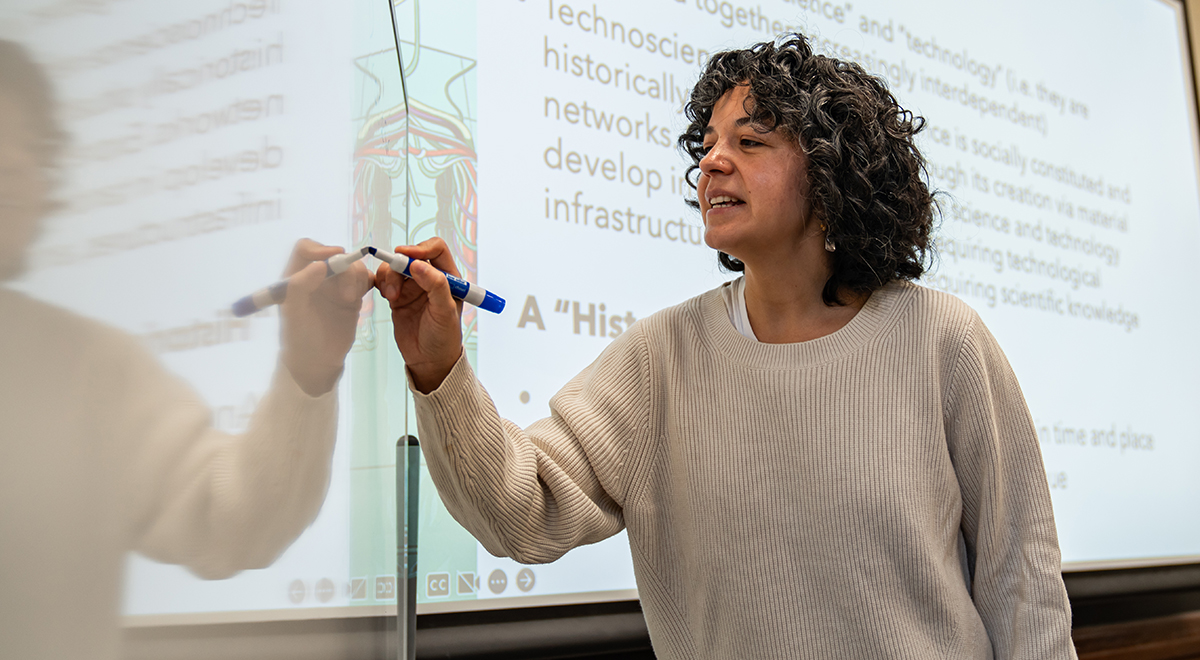Renamed College of Science and Technology Studies Aligns with Growth in the Field

The long-standing Science in Society Program (SiSP) has a brand-new name: the College of Science and Technology Studies (STS). After existing as a program since 1980 with jointly appointed faculty, the newly renamed college appoints its own faculty and draws affiliated faculty from across the humanities and social sciences.
The College of STS is comprised of transdisciplinary faculty with scholarly expertise in historical, philosophical, and social scientific approaches that contextualize the many forms, practices, and institutions that constitute science and technology today.
While still beloved by its over 500 alumni, the program’s unique name for its major “Science in Society” is now more closely aligned with the widely recognized intellectual field known as “Science and Technology Studies.”
Professor of STS and Chair Anthony Hatch said of the change, “We think it offers clarity for faculty and students—it offers a proper alignment with the world outside of Wesleyan.”
The College of STS is one of the oldest academic programs of its kind in the United States. The “College of Science in Society” was founded in 1975, loosely modeled after the Butterfield Colleges of Letters and Social Studies, before becoming a program. In 2023, its faculty advocated to change the designation of the program and name of its major. The changes were reviewed and approved by the University’s Educational Policy Committee and by the University’s academic administration.

Currently, there are 73 STS majors—the ninth largest major at Wesleyan. The STS major offers Wesleyan students historical, social, and philosophical context to scientific inquiry and technological innovation in critical and fast-growing areas such as artificial intelligence and digital media, medicine and public health, multispecies ecologies and anthropogenic environments.
Like the SiSP before it, the College of STS will continue to expose students to the cultural contexts of science and technology as they develop in-depth knowledge of scientific practices, apparatuses, and modes of transdisciplinary analysis.
“It’s about the context of scientific work as something that humans do in social life, in political community, and within an economy,” Hatch said.
All STS majors are required to take four one-credit major track courses in one of 11 sciences at Wesleyan: astronomy, biology, chemistry, computer science, Earth & Environmental Sciences, mathematics, Molecular Biology & Biochemistry, neuroscience, physics, and psychology. Students combine these foundational science courses with six courses in STS, including three courses in history, philosophy, and sociocultural study of science. Roughly 60 percent of STS majors are double majors in the sciences while the remaining 40 percent major solely in STS. Single majors take on an area of concentration in a humanities discipline, social science, or an area study.
With this transdisciplinary training, STS majors pursue graduate study in the sciences and STS; professional training in medicine, public health, and public policy; and meaningful careers in the non-profit and for-profit sectors.
Many STS faculty have upcoming or recently published books on a range of topics, have undertaken significant research, and have received grants to fund key projects with real impact.
Hatch will soon publish a book on how race is materialized through both metaphorical and literal cages, and the potential of biohumanities as a framework for anti-racist critique of the human experience. Mitali Thakor, assistant professor of STS, recently completed a manuscript of a book on the global fight to police and remove child sexual abuse material from digital spaces. Emily Vasquez, assistant professor of STS, is writing a book on the rise of clinic-based disease prevention strategies in Mexico as the nation deals with a diabetes and obesity epidemic. Assistant Professor of STS Elaine Gan is writing a manuscript on the creation and transformation of rice fields.
Joseph Rouse, Hedding Professor of Moral Science and Professor of Philosophy, recently published a book on new developments in evolutionary biology, social theory, and science and technology studies. William Griffin Professor of Philosophy Lori Gruen recently published books on altruism and systems of current thought and action that are failing the animal kingdom. Associate Professor of History Paul Erickson has published two papers exploring the histories of economics and environmental science and is also directing a project on the history of Van Vleck Observatory. Wilbur Fisk Professor of Psychology Jill Morawski most recently published a paper on the meanings of conceptual and direct replication.
Hatch and Thakor co-direct Black Box Labs, a research and training lab that trains students in qualitative research methods and gives students the opportunity to collaborate with faculty. The lab is amid a large-scale archival and creative research project on the history of metabolism cages. Starting in 2025, Black Box Labs will be a key collaborator on a Wellcome Trust Discovery Award, in partnership with the Health and Social Equity Collective, at King’s College London investigating how virtual reality platforms generate empathy for workplace discrimination in health and social care systems.
In other news, after 36 years of teaching, research, and service to the University, John E. Andrus Professor of History Bill Johnston is retiring from Wesleyan this academic year. Johnston is a leading scholar of Japan and East Asian Studies and a prolific photographer.

